
Langages
metrics 2024
Fostering Insightful Dialogue in Language Studies
Introduction
Langages is a premier peer-reviewed journal in the field of linguistics, published by Armand Colin, a reputable French publisher known for its commitment to advancing academic scholarship. With an ISSN of 0458-726X and an E-ISSN of 1958-9549, this journal has been an important platform for linguistic research since its inception in 1976, and it continues to engage with contemporary linguistic debates through to 2024. The journal is ranked in the top two quartiles for linguistics and language, reflecting its significance in the academic community, with a Q2 categorization in 2023, and robust Scopus rankings within the 66th to 69th percentiles across relevant categories. Authors and researchers from around the globe contribute to its rich tapestry of scholarly articles that explore the multifaceted nature of language and its role in society, making Langages an essential resource for linguists, educators, and students alike.
Metrics 2024
 0.18
0.18 0.20
0.20 0.30
0.30 18
18Metrics History
Rank 2024
Scopus
IF (Web Of Science)
JCI (Web Of Science)
Quartile History
Similar Journals
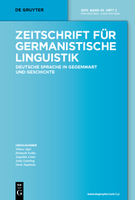
ZEITSCHRIFT FUR GERMANISTISCHE LINGUISTIK
Fostering Scholarly Excellence in German StudiesZEITSCHRIFT FUR GERMANISTISCHE LINGUISTIK, published by WALTER DE GRUYTER GMBH, stands as a pivotal resource in the field of linguistics since its inception in 1973. With its ISSN 0301-3294 and E-ISSN 1613-0626, this esteemed journal serves as an essential platform for researchers and academics focused on the nuances of the German language and its linguistic frameworks. Catering to a diverse audience, the journal features high-impact articles and contributions consistent with rigorous academic standards, as evident from its Q1 categorization in Linguistics and Language and its notable rankings in both the Arts and Humanities and Social Sciences domains. The journal's commitment to advancing knowledge in linguistics fosters a scholarly environment conducive to both emerging and established linguists. While not available through open access, ZEITSCHRIFT FUR GERMANISTISCHE LINGUISTIK remains influential, drawing readers keen on exploring developmental and educational paradigms alongside linguistic theories. With a convergence of research that spans until 2024, it represents a comprehensive body of work integral to the evolving landscape of linguistic studies in Germany and beyond.
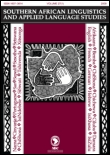
Southern African Linguistics and Applied Language Studies
Advancing Linguistic Knowledge in Southern AfricaSouthern African Linguistics and Applied Language Studies is a prestigious journal dedicated to the exploration and analysis of linguistics and applied language studies within the Southern African context. Published by Taylor & Francis Ltd, this esteemed journal has established itself as a significant platform for scholars and practitioners since its inception in 2003. With an impressive Q2 ranking in the Linguistics and Language category and a current Scopus rank of #430 out of 1167, it occupies a vital position in the academic landscape, appealing to a diverse readership keen on linguistic research, language policy, and applied linguistics. While the journal is not currently open access, it provides comprehensive insights and scholarly articles that foster understanding and innovation in linguistic practices and language education. As of 2024, the journal continues to deepen its impact through rigorous peer-review and a commitment to advancing knowledge, making it a key resource for researchers, educators, and students seeking to navigate the complexities of language within the Southern African region and beyond.

DEUTSCHE SPRACHE
Fostering a Passion for the German Language and Its StudiesDEUTSCHE SPRACHE, published by Erich Schmidt Verlag, is a pivotal journal dedicated to the intricate study of the German language. With its ISSN 0340-9341 and E-ISSN 1866-5233, this publication serves as a vital resource for linguists, educators, and language enthusiasts alike. Spanning diverse topics within the fields of linguistics and language, psychology, and social sciences, the journal has earned a Q3 ranking in Linguistics and Language, alongside a Q4 ranking in both Psychology (miscellaneous) and Social Sciences (miscellaneous) as of 2023. Although the journal is not Open Access, it provides invaluable insights on the developments in German language research from its convergence years of 2002 to 2011 and 2017 to 2023. Positioned in Berlin-Tiergarten, Germany, DEUTSCHE SPRACHE continues to expand its influence and accessibility to researchers, professionals, and students keen on understanding the nuances of linguistic expression in the German language.

Estudios de Linguistica-Universidad de Alicante-ELUA
Unlocking the Future of Linguistics Through Open AccessEstudios de Linguistica-Universidad de Alicante-ELUA is a distinguished academic journal dedicated to advancing the field of linguistics, published by Universidad de Alicante. With an Open Access model adopted since 2020, ELUA facilitates greater accessibility to pioneering research for scholars and enthusiasts alike. The journal's ISSN is 0212-7636 and its E-ISSN is 2171-6692, ensuring it is indexed and easily discoverable in academic databases. Though the journal's H-Index is currently not specified, its commitment to disseminating high-quality linguistics research positions it as a valuable resource for researchers, professionals, and students. The journal aims to foster scholarly dialogue and innovation in various linguistic domains, making it an essential platform for sharing insights and findings that shape contemporary linguistic studies. Based in Alicante, Spain, ELUA is poised to contribute significantly to the global linguistics landscape.
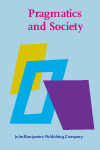
Pragmatics and Society
Connecting Linguistic Insights with Social PracticesPragmatics and Society, published by John Benjamins Publishing Co, is an esteemed journal that serves as a vital platform for the interdisciplinary exploration of language use in social contexts. Established with the aim of bridging the gap between pragmatics and social theory, this journal covers innovative research and critical methodologies within linguistics and language studies. With an impressive impact factor and recognition as a Q2 journal in the field of Linguistics and Language for 2023, it ranks notably within the 75th percentile for Arts and Humanities and 73rd for Social Sciences. Based in the Netherlands, Pragmatics and Society is dedicated to fostering scholarly discussions and advancing knowledge in areas such as discourse analysis, sociolinguistics, and communicative practices. Researchers, professionals, and students alike will find this journal to be an invaluable resource for understanding the complexities of language in society and are encouraged to engage with its rigorous publications.

LINGUISTIQUE
Exploring the Depths of Linguistic KnowledgeLINGUISTIQUE, an esteemed journal published by PRESSES UNIV FRANCE, serves as a vital platform for scholarly discourse in the fields of linguistics and language studies. With its ISSN 0075-966X and E-ISSN 2101-0234, this French journal has been a significant contributor to the understanding of linguistic phenomena since its inception in 2004, and it continues its journey through to 2024. Although currently categorized in the Q4 quartile for both Arts and Humanities (miscellaneous) and Linguistics and Language, its commitment to publishing quality research encourages a diverse range of articles, reviews, and innovative studies. Positioned in the 32nd and 29th percentiles for its respective fields according to Scopus rankings, LINGUISTIQUE is dedicated to advancing knowledge and stimulating engagement among researchers, professionals, and students alike. While it does not offer open access, the journal remains an essential resource for those who seek to deepen their understanding of linguistic principles in a global context, facilitating a richer discourse that connects theory with practice.
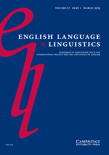
English Language & Linguistics
Unveiling the Nuances of Linguistic ResearchEnglish Language & Linguistics is a prestigious journal published by Cambridge University Press, specializing in the dynamic fields of linguistics and language studies. With an impressive Q1 ranking in both Linguistics and Language categories for 2023 and a notable placement in the Scopus metrics, where it ranks #142 out of 1088 in Arts and Humanities, the journal is recognized for its high-quality research contributions and robust impact in the scholarly community. Since its inception in 1997, English Language & Linguistics has provided a forum for researchers to explore various aspects of language, facilitating the dissemination of innovative ideas and empirical studies. With no open access options currently available, the journal remains a valuable resource within the United Kingdom and beyond, fostering a deeper understanding of language intricacies and their broader societal implications. For practitioners and academicians alike, this journal is a critical resource for keeping abreast of the latest advancements in linguistics.

RLA-Revista de Linguistica Teorica y Aplicada
Navigating the complexities of language through rigorous analysis.RLA-Revista de Linguística Teórica y Aplicada, published by Universidad de Concepción, Facultad de Humanidades y Arte, stands as a vital resource in the field of linguistics, delivering cutting-edge research and scholarly articles that contribute to both theoretical and applied linguistics. With its ISSN 0718-4883, this journal aims to foster robust discussions and innovations in linguistic theory, language acquisition, sociolinguistics, and applied linguistics methodologies. Although the journal currently does not provide open access options, it endeavors to reach a diverse audience, including researchers, professionals, and students, who are keen to explore the rich tapestry of language studies. By offering insights from both local and global perspectives, RLA does not only advance linguistic discourse but also encourages interdisciplinary collaboration, thereby solidifying its role as a pivotal publication in the linguistic academic community.
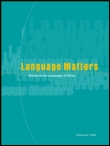
Language Matters
Unveiling the Power of Language DynamicsLanguage Matters is a prestigious journal dedicated to the dynamic field of Linguistics and Language, published by Routledge Journals, Taylor & Francis Ltd in the United Kingdom. With an ISSN of 1022-8195 and an E-ISSN of 1753-5395, this journal serves as an essential platform for scholars seeking to explore the multifaceted relationships between language and society. Recognized in the 2023 Category Quartiles as Q2 in Linguistics and Language, it boasts impressive Scopus rankings, sitting at #298 out of 1088 in the Arts and Humanities category and #356 out of 1167 in Social Sciences, highlighting its significant impact on the field with a 72nd and 69th percentile ranking, respectively. The journal's scope encompasses a wide range of topics including language acquisition, sociolinguistics, and psycholinguistics, making it a vital resource for researchers, educators, and students alike. By not offering open access, it maintains a curated selection of high-quality peer-reviewed articles, ensuring that academic rigor and relevance are upheld for its readership. With a publication range spanning from 1993 to 2024, Language Matters continues to shape conversations and advance knowledge in the ever-evolving landscape of linguistic research.

Turkic Languages
Fostering Understanding of Turkic Languages WorldwideTurkic Languages is an esteemed academic journal published by HARRASSOWITZ VERLAG, dedicated to the exploration and analysis of Turkic languages within the broader fields of linguistics and language studies. With an ISSN of 1431-4983, this journal serves as a vital platform for researchers, professionals, and students interested in the intricate structures, dynamics, and cultural contexts of Turkic languages. Although it currently operates without an Open Access option, the journal's commitment to quality research is evident in its placement within the Q4 category of Linguistics and Language for 2023, alongside its Scopus rankings where it stands in the 30th and 26th percentiles for Language and Linguistics across Arts and Humanities and Social Sciences, respectively. The journal's scope encompasses a variety of linguistic phenomena, striving to foster a deeper understanding of Turkic languages and their significance in the global linguistic landscape. With converged years from 2017 to 2022, Turkic Languages continues to uphold its reputation as a crucial resource for advancing scholarship in this specialized field.